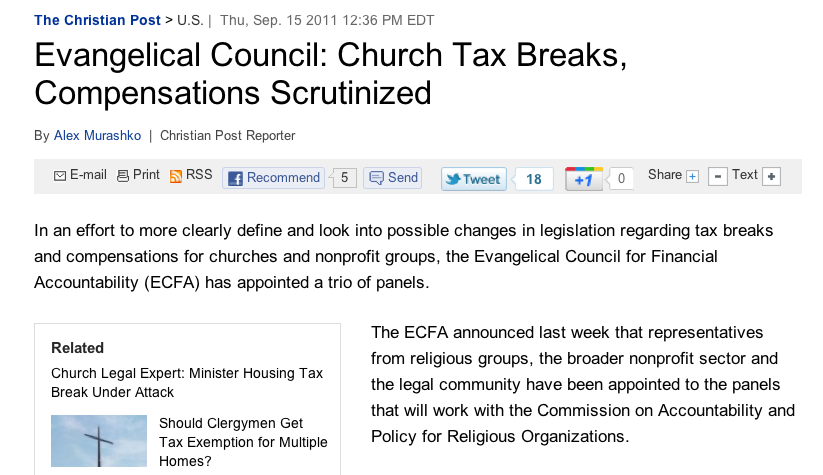Commission to Explore Whether Churches Should Be More Accountable to Government
 In an effort to more clearly define and look into possible changes in legislation regarding tax breaks and compensations for churches and nonprofit groups, the Evangelical Council for Financial Accountability (ECFA) has appointed a trio of panels.
In an effort to more clearly define and look into possible changes in legislation regarding tax breaks and compensations for churches and nonprofit groups, the Evangelical Council for Financial Accountability (ECFA) has appointed a trio of panels.
The ECFA announced last week that representatives from religious groups, the broader nonprofit sector and the legal community have been appointed to the panels that will work with the Commission on Accountability and Policy for Religious Organizations.
The commission was formed following a report issued by U.S. Sen. Charles Grassley (R-Iowa) in January that focused on the financial practices of six high-profile Christian ministries, ECFA said. Allegations included perceptions of excessive spending on high-end travel, accommodations, and property, according to a commission member.
After Grassley released the findings of his three-year inquiry, rather than seek legal action, the senator asked ECFA to lead an independent national review that includes making recommendations on accountability and policy issues affecting religious and other nonprofit organizations.
Florida pastor and one of President Obama’s spiritual advisers, Dr. Joel Hunter, who is a member of the ECFA commission, told The Christian Post that he would like to see the panels discover that new legislation is not necessary.
“We have been given the opportunity to gather this kind of information so that we could not just automatically go toward legislative resolutions, but rather we could do some self-examination and try to clarify what was reasonable and what was intended for religious exemptions by the IRS and by the customs we now have in the U.S.,” Hunter said.
“Part of this idea [of tax breaks and compensations] is that the churches and other non-profits contribute so much to the public well-being. They contribute so many services, and so much benefit that they more than make up for any exemptions and taxes that they have.”
The ECFA stated that the issues before the commission include whether:
churches should be more accountable to the federal government; legislation is needed to curb perceived abuses of the clergy housing allowance exclusion; the current prohibition against political campaign intervention by churches and other nonprofits should be repealed or modified; the rules for determining the reasonableness of nonprofit executive compensation should be tightened; penalties should be expanded for nonprofits and their leaders who engage in prohibited activities. Hunter said that the commission and panel studies should also include educating people on the positive aspects of giving faith-based groups and nonprofits certain tax breaks.
“Our responsibility is to continue to tell the story of just exactly how much churches, and mosques, and synagogues, and temples are providing in the way of goods and services to those in need in our communities,” he said. “The good things that they are providing would otherwise fall upon the government to provide. We would like people to clearly see that this is a wonderful investment.”
Hunter said he recognizes the potential for abuses, but believes much of allegations are about perceptions.
“There were some perceived violations, some perceived expenditures that people looked upon,” he said. “The lavish houses and jets and all of that kind of stuff that people reasonably look at and say, ‘Wait a minute, are we as taxpayers contributing to that kind of excess and is that right? Was that the intent of a reasonable exclusion (tax break)?’”
The ECFA Commission will also be receiving input from the Internal Revenue Service, town hall meetings and other informal channels. Two law firms will be providing independent technical analysis and research for the commission on a pro-bono basis.
According to ECFA President Dan Busby, a total of 66 members have been named to the panels by Commission Chairman Michael Batts. The three panels include one of Religious Sector Representatives, one of Nonprofit Sector Representatives, made up of 18 individuals, and one of Legal Experts.
Ultimately, Hunter said the panels will make “an effort to put in reasonable boundaries and put in some self-correcting measures that will hopefully avoid legislation.”
“In the end, there may be a mix of self-policing and some necessary legislation. We do not know that yet. It would be preferable to avoid legislation, but we are not that far along the process, yet,” he said.
Alex Murashko Christian Post Reporter
FIND THIS ARTICLE AT: http://www.christianpost.com/news/evangelical-council-church-tax-breaks-compensations-scrutinized-55657/

